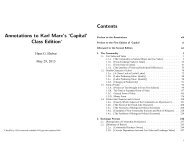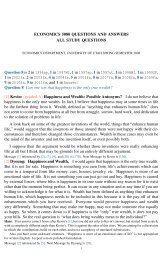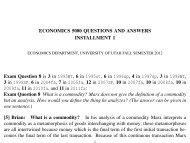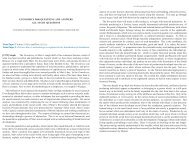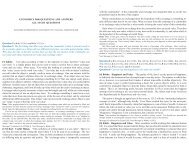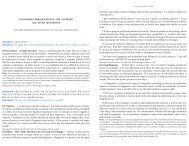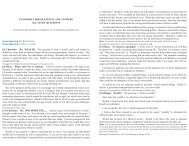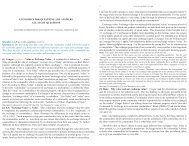Question 1 What did Marx mean with his formu - University of Utah
Question 1 What did Marx mean with his formu - University of Utah
Question 1 What did Marx mean with his formu - University of Utah
Create successful ePaper yourself
Turn your PDF publications into a flip-book with our unique Google optimized e-Paper software.
U <strong>of</strong> <strong>Utah</strong> Econ 5080 2005fa 71<br />
money represents the utility <strong>of</strong> the buyer; in <strong>Marx</strong>’s economics, by contrast, money represents the labor in the<br />
product.<br />
Message [135] referenced by [137]. Next Message by Prairierose is [494].<br />
[137] Michael: Comments on Prarierose’s response. Prarierose says in [135]: “In a<br />
capitalist society it is only possible for labor to be measured as abstract labor.” Be careful<br />
here. Abstract labor isn’t something directly observable; <strong>Marx</strong> is arguing that the form in<br />
which abstract labor manifests itself is exchange value, which is measurable. In fact, only<br />
on the basis <strong>of</strong> abstract labor, as it acts as common denominator, can different concrete<br />
labors be compared; while only concrete labors can be measured. T<strong>his</strong> is the duality <strong>of</strong><br />
(commodity producing) labor: that it is concrete and abstract; qualitative and quantitative;<br />
produces use-values and, at the same time, value. To be clear, we can speak <strong>of</strong>, say, two<br />
hours <strong>of</strong> a doctor’s labor and three hours <strong>of</strong> a computer programmer’s labor, in which case<br />
we have measured concrete labors; but we can’t sensibly compare the two according to their<br />
respective products, which are two different use-values.<br />
Next Message by Michael is [299].<br />
<strong>Question</strong> 111 is 701 in 2003fa, 110 in 2004fa, and 126 in 2007fa:<br />
<strong>Question</strong> 111 Carefully explain the <strong>mean</strong>ing <strong>of</strong> the statement: “The dissolution <strong>of</strong> all commodities<br />
into labor-time is no greater an abstraction, and is no less real, than the dissolution<br />
<strong>of</strong> all organic bodies into air.”<br />
[1846] BonzoIsGod: graded A– Abstraction <strong>of</strong> Commodities. <strong>Marx</strong> is simply stating<br />
that as long as there is production, commodities can be broken down into the consumption <strong>of</strong><br />
human labor-power. T<strong>his</strong> simple abstraction is analogous to the acceptance that all organic<br />
materials can be broken down into air, thus to show the “dissolution” <strong>of</strong> commodities is<br />
not so “far-fetched.” “Just as burning is a real abstraction in nature, so the reduction <strong>of</strong> all<br />
commodities to the expenditure <strong>of</strong> human labor-power contained in them is a real abstraction<br />
made in society whenever there is commodity production” (Ehrbar, 58).<br />
Hans: Production is always the consumption <strong>of</strong> human labor-power; you don’t need commodity production for t<strong>his</strong><br />
to be the case. But in commodity production, the allocation <strong>of</strong> labor has to follow the market, therefore the intrinsic<br />
equality <strong>of</strong> all labors as the expenditure <strong>of</strong> human labor-power becomes a practical fact and not just a thought.<br />
You don’t need any “acceptance” that organic compounds can be broken down into air; all you need to do is put<br />
a match to them.<br />
Final Grading Note by Hans: You are breaking new ground; for many <strong>of</strong> the homework questions your answer<br />
was the first answer. Always thoughtful and interesting to read. But I would have liked to see you try your acumen<br />
on one <strong>of</strong> the really central questions <strong>of</strong> <strong>Marx</strong>ian theory.<br />
Excerpt from a recommendation letter: He is an independent thinker who expresses himself clearly and concisely.<br />
Every word written by him counts, he cuts down to the essentials. His discourse is logical and easy to<br />
understand. He wrote an essay about himself which was disarmingly honest and subtly humorous <strong>with</strong>out being<br />
self-deprecating. (But he was diplomatic enough to slip in some flattering remarks about my class.) He is a wellorganized,<br />
reliable, and steady worker, <strong>of</strong>ten the first to submit a given assignment. He <strong>did</strong> not take advantage <strong>of</strong><br />
an easy extra-credit assignment which many <strong>of</strong> <strong>his</strong> peers used to improve their grades. I.e., he <strong>did</strong> <strong>his</strong> job but <strong>did</strong><br />
not fish for grades. Through all <strong>his</strong> interactions shines through a sincere person <strong>with</strong> integrity. I think law school<br />
is a good career choice for him. He has the intelligence and character to succeed and will be liked by the people<br />
interacting <strong>with</strong> him.<br />
Message [1846] referenced by [2007fa:722]. First Message by BonzoIsGod is [34].<br />
[1869] Geo: graded B– The <strong>mean</strong>ing <strong>of</strong> the statement, “The dissolution <strong>of</strong> all commodities<br />
into labor-time is no greater an abstraction, and is no less real, than the dissolution <strong>of</strong><br />
72 2005fa Econ 5080 U <strong>of</strong> <strong>Utah</strong><br />
all organic bodies into air,” is that even though the abstraction <strong>of</strong> transforming commodities<br />
into labor time is difficult, it is possible because it is from the labor-time that the commodity<br />
takes on its true from. It is a “real” abstraction just like the abstraction <strong>of</strong> transforming<br />
organic bodies into air because one can break down the ‘substance’ or composition <strong>of</strong> a<br />
commodity’s value into different elements. One <strong>of</strong> the elements <strong>of</strong> course is labor time. The<br />
annotations state that “the reduction <strong>of</strong> all commodities to the expenditure <strong>of</strong> human laborpower<br />
contained in them is a real abstraction made in society whenever there is commodity<br />
production.” It is such abstractions that allow us to see better what elements determine commodity<br />
value which plays a vital role in capitalist modes <strong>of</strong> production.<br />
Hans: Your theory according to which one <strong>of</strong> the elements <strong>of</strong> a commodity’s value is <strong>of</strong> course labor-time sounds<br />
like the cost-theory <strong>of</strong> value which I tried to criticize in [1387] and elsewhere.<br />
Final Grading Note by Hans: You made some interesting contributions, but they do not have to do enough <strong>with</strong><br />
<strong>Marx</strong>’s theory. I already said t<strong>his</strong> in response to your [544].<br />
Message [1869] referenced by [2007fa:722]. First Message by Geo is [98].<br />
[1953] Sonja: graded B The dissolution <strong>of</strong> all organic bodies into air implies a most<br />
extreme reduction to a basic form. Dissolving commodities into labor time is reducing them<br />
to their most basic form, one that is common to all commodities. Since many degrees <strong>of</strong><br />
labor power can be put into the making <strong>of</strong> a commodity, it must be reduced or abstracted<br />
into something that is common to all commodity production: that is the basic expenditure<br />
<strong>of</strong> human brain, muscle, etc. Hans states that the process <strong>of</strong> transforming organic bodies<br />
into air is what makes t<strong>his</strong> abstraction real. <strong>What</strong> makes the abstraction <strong>of</strong> a commodity into<br />
labor time real is that it is made in society every time a commodity is produced and human<br />
labor power is used.<br />
Hans: <strong>Marx</strong> <strong>did</strong> not try to find the most basic form <strong>of</strong> commodities, but he was looking for something all commodities<br />
have in common which would justify why all commodities can be turned into the same thing, money, on<br />
the market.<br />
The process <strong>of</strong> transforming organic bodies into air has no direct connection <strong>with</strong> the dissolution <strong>of</strong> all commodities<br />
into labor-time; it was only used by <strong>Marx</strong> as another example explaining the concept <strong>of</strong> a real abstraction.<br />
Message [1953] referenced by [2007fa:722]. First Message by Sonja is [935].<br />
[1954] Hans: Human labor as a real abstraction. T<strong>his</strong> question takes us back to chapter<br />
One, therefore let us quickly recapitulate <strong>Marx</strong>’s argument there. <strong>Marx</strong>’s starting point<br />
was the exchange-relations between commodities, from which <strong>Marx</strong> inferred that there is<br />
something equal in the commodities. Think <strong>of</strong> it t<strong>his</strong> way: on the market we see that all<br />
commodities can be turned into the same thing and can be bought <strong>with</strong> the same thing,<br />
namely money. T<strong>his</strong> ritual on the surface only makes sense if there is indeed something<br />
equal which all commodities share. And then <strong>Marx</strong> said: yes, there is something which all<br />
commodities have in common, namely, they all are the products <strong>of</strong> labor.<br />
<strong>Marx</strong> therefore arrived at labor by a sort <strong>of</strong> conclusion which in critical realism is known<br />
as a second-order argument. <strong>Marx</strong> already knew that commodities had to have something<br />
in common when he set out to find t<strong>his</strong> common thing. But when he found the thing which<br />
they do have in common it turned out that t<strong>his</strong> thing looks a little different than what he<br />
had expected. His expectation was not only that it is something all commodities have in<br />
common, but also that it is something homogeneous. Unfortunately, the only thing which<br />
the commodities have in common is labor, and labor is not homogeneous.



